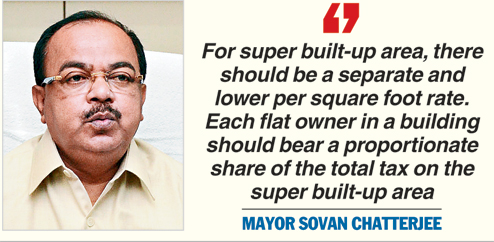
If you have been eyeing a new apartment within the Calcutta Municipal Corporation (CMC) area, your future property tax burden just got lighter.
Mayor Sovan Chatterjee this week gave a sneak peek into the proposed calculation method that excludes super built-up area like common corridors, staircases, joggers' track, swimming pool and garden from the ambit of individual tax.
"For super built-up area, there should be a separate and lower per square foot rate. Each flat owner in a building should bear a proportionate share of the total tax on the super built-up area," the mayor told a meeting with the municipal commissioner and the assessor collectors.

A notification by the municipal commissioner regarding the change is expected soon.
The change will initially benefit only new home buyers, but sources in the CMC said taxes were likely to be gradually revised for all property owners based on their individual carpet area.
As and when the revised method of calculation takes effect, a new Rs 80-lakh apartment of 1,000sq ft within a south Calcutta complex would cost its owner much less by way of property tax than a flat of similar size that someone else already owns.
Currently, the assessment department calculates the annual property tax on the area mentioned in the document issued by the Registrar of Assurance, which in this case is 1,000sq ft. But since the proportionate share of common facilities accounts for 25 to 30 per cent of the super built-up area that the home buyer has paid for, the carpet area would be only 750sq ft.
The CMC has been calculating annual house tax on the basis of "reasonable rent" since 1863.
Reasonable rent is the notional value of the rent that an assessment inspector thinks a flat would fetch per square foot annually if it is let out at the current market rate in that particular area. At present, the reasonable rent per square foot per month of a flat varies between Rs 2.30 and Rs 8.50, based on the locality.
Under the present system, if the civic assessment department fixes the reasonable rent at Rs 7 per square foot per month for a property, tax is calculated on the total area mentioned in the registered deed to arrive at the monthly valuation. For annual valuation, the tax amount will be multiplied by 12.
For a 1,000sq ft property, the total annual valuation would be 1000sq ft x Rs 7 x 12 = Rs 84,000. Generally, 40 per cent of the annual valuation is charged as annual property tax. But before determining the taxable annual valuation, the CMC deducts 10 per cent from the total as maintenance cost of the flat.
Hence, the actual taxable amount based on annual valuation would become Rs 84,000 - 8,400 = Rs 75,600. Since 40 per cent of Rs 75,600 would be the annual house tax, the quantum of civic house tax would work out to Rs 30,240 in a year.
If the owner had to pay tax based solely on the carpet area (750 sq ft), the annual property tax would be Rs 22,800. Taking the reasonable rent for the 250 sq ft of common area to be Rs 2 per square foot per month, the owner would need to pay an additional amount of Rs 2,160 annually. So, the total tax on the 1,000sq ft apartment would be Rs 24,960 (Rs 22,800 + Rs 2,160) instead of Rs 30,240 annually, based on the current method of calculation.
The CMC collects Rs 500 crore every year by way of property tax. Once the proposed change takes effect, the civic body is likely to lose about 10 to 15 per cent of its revenue.
Mayor Chatterjee said he wasn't too bothered about the prospect of diminishing revenue because many new properties were coming up and the civic body could hope to compensate for it through a widening tax net. "In the name of revenue mobilisation, the assessment wing of the CMC is over-stretching the affordability of properties. Home buyers are already over-burdened with housing loans and monthly maintenance charges," he told Metro.
Around 30,000 flats are currently in various stages of construction across the CMC belt.
Another practice that mayor Chatterjee is aiming to stop is mutation of flats by promoters. According to him, this compromises the interest of the property owner. "Mutation will be allowed only after purchase of a flat," he said.
Many promoters get flats mutated on behalf of their buyers, paving the way for tax to be fixed without the eventual taxpayer getting a hearing. Officials of the assessment department allegedly make money from the promoters under this system.











